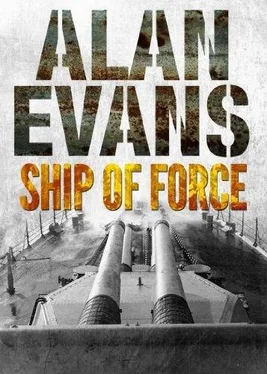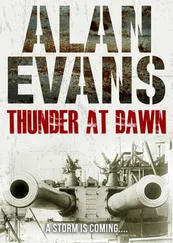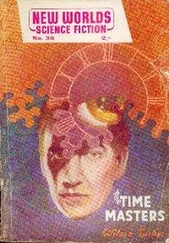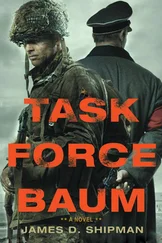The man with the broken leg yelped and swore and Brodie said, “A’ right! Ye’ll dae fine! Easy now!”
Morris looked back at Smith. “Happened? Oh —” He hesitated, looking into the mug again, then asked, “No sign of Bill — my observer, sir?”
“No. I’m sorry.”
Morris nodded. Briefly he looked a very old fifteen. He blinked up at Smith, his gaze empty. “Never saw him after we hit. I paddled around for a long time and shouted, but it was very dark. I never saw him.”
Smith saw his mouth twitch. This wouldn’t do. If the boy broke down before the others he would be ashamed of himself afterwards. Though he should not. Smith knew something of that. He asked quickly, “What were you doing?”
The boy blinked again but this time focusing on Smith, trying to think, remembering…“Fairly routine, run-of-the-mill stuff. Reconnaissance over Ostende and the coast north of it. Only thing is, we’ve been getting a bit of a pasting up there lately. Margaret was our fourth loss in ten days.”
“Margaret?”
“My RE8, sir.” A faint grin. “I called her after a girl I know.”
Smith said, “I see. And you were the fourth?”
“Fourth aircraft lost. Nobody at all came back from the others. Henry — er, Squadron Commander Dennis, that is — he’ll be glad I’m all right but he won’t be too pleased about Margaret. Because of the other three he wasn’t frightfully keen on my going but — orders is orders. Anyway. The other times they sent some cover, a flight of fighters, but that ended up in a dog-fight and more losses. So this time I thought: Why not try a bit of cunning? So we went without cover, flew off in the early evening, made a big circle out to sea and came in with the sun behind us.”
He paused, sipped from the mug. Smith could smell the whisky, Brodie’s dram had been a hefty one. Morris went on, “It turned out there wasn’t much sun but the wheeze worked anyway, up to a point. We got in all right and I made a fast circle low over Ostende then ran inland and flew north. We ran right up to the north of De Haan, nearly up to Blankenberge and then we turned south along the coast.” He looked at Smith and explained. “You see, sir, they’ve been keeping a fighting patrol flying over De Haan permanently. There’s always one Albatros V-strutter in the air and they can whistle up a lot more in minutes.”
Smith said, “Albatros what?”
Morris explained, “Albatros V-strutter. Their lower wing is shorter and narrower than the upper so the struts come down to a point like a V. They’re hot stuff; two machine-guns. The Triplanes we’ve got at St. Pol can fight ’em because the ‘Tripe hound’ is more manoeuvrable an’ goes up like a rocket. But a Harry Tate hasn’t got much hope.”
Smith nodded and Morris went on, “So the idea was to come at them from the north. See? Not from the direction of France. Anyway, all the way up Bill had the camera going like mad but he kept shaking his head and making ‘wash-out’ signs with his hands meaning he couldn’t see anything new. So then we turned south and ran back down the coast. Sneaking in like that we got away with it for a few minutes. The light was a bit dim by then; it had started to rain again. It’s been raining a lot. Bill and me, we’ve got a cricket side together in the squadron but we haven’t had a knock for days. Bloody weather…” Morris’s voice trailed off and he was silent for a few seconds. When he went on his voice was a little louder, a little clearer, more deliberately casual. “I’d taken her down as low as I dared and Bill was hanging over the side of the cockpit and I had my head poked out so what there was to see, we saw. And there was nothing. Nothing new, that is. Except when we were just south of De Haan. There’s a biggish wood runs inland from the coast and there were a lot of chaps on the beach there. They seemed to be bringing a boat up from the sea.”
Smith broke in, “What kind of boat?”
“Well, we were over and past in a second.” Morris screwed up his face, trying to remember, then shook his head. “Bill could have told you but I was trying to fly as well. Might have been a fishing-boat. Seemed sort of wide-ish, blunt-ish. A bit like a shoe-box, it was so square. No armament, though, that’s definite. I’d have noticed a gun. Bill was excited, seemed to think he could see something in the wood, had the camera going.”
He took a swallow from the mug and Smith asked, “And that was all you saw?”
Morris nodded. “After that, for one reason and another I thought we might as well go home.”
“What reasons?”
“The light was going bad on us, of course. On top of that we started to get a lot of Archie coming up from the wood.”
Archie was anti-aircraft fire. Smith said quietly, “From the wood?”
Morris nodded. “ That was new. We didn’t know they had Archie hidden in the wood. It gave us a hell of a fright.”
Smith could imagine it bursting around Morris and his observer, tossing their little aeroplane about the sky.
He sat very still as Morris went on, speaking more quickly, nearly finished and wanting to get it over. “I turned out to sea and got right down on it and that got us out of the Archie. But then that damned permanent patrol of theirs came down behind us and chased us out to sea. Albatros V-strutters, like I said. Three of them. They gave us a pasting until they turned back after a bit, but by then they knew they’d got us. The engine was dicky, smoking and burning. Just as it was getting dark I had to put her down in the sea. And that was that. I hung on to a lump of the fuselage and then your chaps pulled me out.”
Smith imagined Morris in the sea, paddling about looking for Bill. Darkness all around him, hiding him, and the cold reaching out fingers to clutch at his heart. While all the time the observer lay dead far beneath him.
Smith said, “I think you did very well.”
Morris shrugged, embarrassed, shuddered as he drained the mug. “Wish I could have saved the camera. I’m sure Bill got something at the end.”
Smith felt a touch on his shoulder, looked around and saw Brodie. The steward said “Mr. Sanders would like a word sir. He says, would you go over, please.”
Smith stood up and saw past Brodie’s shoulder the face of Sanders, looking at him anxiously. He said to Morris, “I’m sorry about your observer. I should try to get some sleep if were you.” He reached out and took the empty mug, passed it to Brodie and then asked Morris, “Anything you want?”
He shook his head. “No, sir. Thank you.” The pilot huddled down into the blanket, pulled it over his head and rolled on to his side, turning his back on the wardroom, its sights, sounds and smells, turning his back on the world. Clearly he had taken all he could stand for that day.
Smith paused a moment, looking down at him. If the war went on long enough or Morris lived long enough then one day he would have taken all he could ever stand of war, and then they would send the wreckage home. They might call it shellshock or flying sickness D but it meant you were finished.
Smith swung away, sidled between two of Judy’s crew sprawled snoring on the deck and across to the couch where the U-boat commander lay. He looked to be a tall man. He lay on the couch with his head and shoulders propped up against the bulkhead. Brodie had set him up like that so he could still draw what breath was left to him. He was lean with a thin, hard-boned face that was pallid now and glistened oily with sweat in the dim yellow light. His eyes were closed but his mouth gaped as he fought for breath. He was naked under the blanket that was pulled up to his chest and that heaving chest was swathed in bandages. The rags of the uniform they had cut from him lay on the deck beside him. It was salt- and blood-stained and filthy with oil but the insignia was that of a Kapitänleutnant of the Imperial German Navy.
Читать дальше












